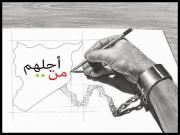This is Why We Took to the Streets

When my phone rang that day last year, I had only been out for a few hours after spending four days in prison. I had been detained for participating in a demonstration in Al-Maidan neighbourhood in July 2011.
I didn’t recognise the caller’s number that showed up on my phone, but I answered anyway.
“You owe me several smacks and electric shocks, as well as countless whippings,” the voice said.
I started trembling as I didn’t understand what the caller was getting at.
“I’m Rafat,” he said. “Do you remember when you issued a statement calling for an end to the siege of Deraa? The ‘milk statement’?”
Then I remembered who it was. Rafat was a young journalist who defended me after I issued that statement in April 2011, at the start of the revolution. I had written a three-line statement calling on the Syrian government to allow humanitarian aid and milk for children into the besieged region of Daraa.
The number of signatures on this petition reached 1,400, including several writers and artists. As a result, the regime’s media started a hideous campaign to defame me and five of the signatories. They called us traitors as well as other horrible names.
At the peak of the campaign, Rafat called me from inside Syria. The mere act of contacting me was a risk in itself. Not everybody had spoken out at that point. Not everybody had broken through fear barrier.
When I answered that telephone call, I was crying, choking and near collapse. My photo had been circulated alongside cruel accusations, and the pro-regime TV channel Al-Dunia was making very negative comments about me.
Rafat was moved when he heard me speak. He was extremely eager to defend me, and very courteous. He asked me a few questions about the statement and my own position. The following day, a wonderful article written by him was published. That article helped heal the wounds that the regime media had inflicted on me.
It didn’t occur to me to call Rafat after the article appeared, as I was sunk in depression for a whole month as the campaign defamation continued. Nor did it occur to me that the article he had written prompted his arrest by the intelligence service and detention over many months, during which time his body was wracked by torture.
After he was released, Rafat made the phone call that caused me so much initial confusion. He had heard that l had been arrested, then released. At the end of the call, he said, “Rima, it doesn’t matter that I was subjected to all that torture. What matters is that you carried on with your revolution, and that they could neither break nor silence you. The awareness that you were still protesting was a relief. It was enough for me.”After our call was over, I continued shaking for two whole hours. I had mixed feelings of appreciation for Rafat, and guilt for what had happened to him. I was deeply saddened and confused about why the regime would arrest and torture a young man when he was just doing his duty as a journalist by expressing his own views and defending mine.
For me, Rafat is one of the heroes of the revolution. He is an icon of the liberty for which everyone in Syria took to the streets. It is the regime’s treatment of Rafat that feeds our persistence. Such barbarism and systematic repression must end.Rafat embodies the spirit of both a free journalist and a brave man. It is people like him who are out on the streets for the sake of freedom. It is for people like him that we will be victorious.Because we are human, we deserve a better existence. We have a right to shout as loud as we can to demand a better future and all of our freedoms. We have a right to make a choice, because we are rational beings who have historically contributed to the advancement of human civilisation.

